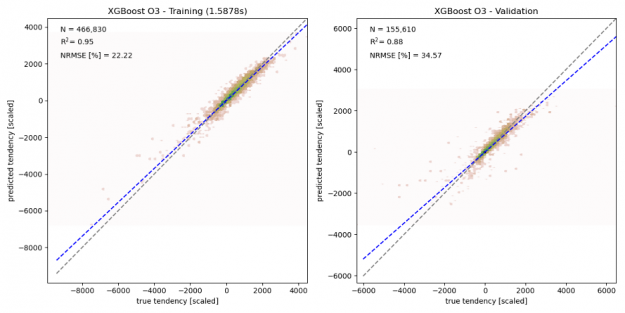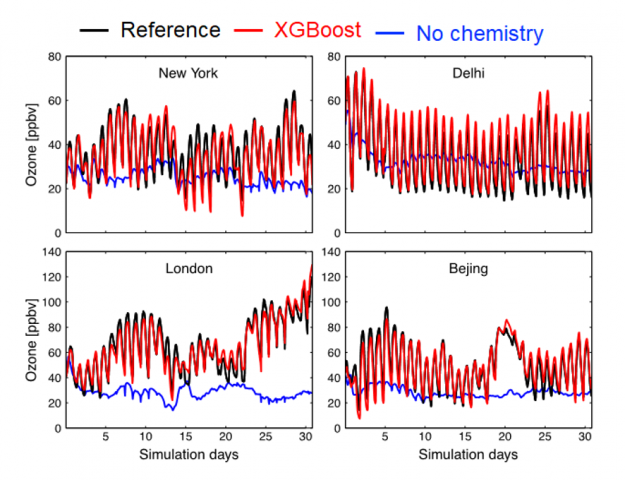Posted by Negar Saei, Program Manager, University Relations
In March 2020 we introduced the Research Scholar Program, an effort focused on developing collaborations with new professors and encouraging the formation of long-term relationships with the academic community. In November we opened the inaugural call for proposals for this program, which was received with enthusiastic interest from faculty who are working on cutting edge research across many research areas in computer science, including machine learning, human computer interaction, health research, systems and more.
Today, we are pleased to announce that in this first year of the program we have granted 77 awards, which included 86 principal investigators representing 15+ countries and over 50 universities. Of the 86 award recipients, 43% identify as an historically marginalized group within technology. Please see the full list of 2021 recipients on our web page, as well as in the list below.
We offer our congratulations to this year’s recipients, and look forward to seeing what they achieve!
Algorithms and Optimization
Alexandros Psomas, Purdue University
Auction Theory Beyond Independent, Quasi-Linear Bidders
Julian Shun, Massachusetts Institute of Technology
Scalable Parallel Subgraph Finding and Peeling Algorithms
Mary Wootters, Stanford University
The Role of Redundancy in Algorithm Design
Pravesh K. Kothari, Carnegie Mellon University
Efficient Algorithms for Robust Machine Learning
Sepehr Assadi, Rutgers University
Graph Clustering at Scale via Improved Massively Parallel Algorithms
Augmented Reality and Virtual Reality
Srinath Sridhar, Brown University
Perception and Generation of Interactive Objects
Geo
Miriam E. Marlier, University of California, Los Angeles
Mapping California’s Compound Climate Hazards in Google Earth Engine
Suining He, The University of Connecticut
Fairness-Aware and Cross-Modality Traffic Learning and Predictive Modeling for Urban Smart Mobility Systems
Human Computer Interaction
Arvind Satyanarayan, Massachusetts Institute of Technology
Generating Semantically Rich Natural Language Captions for Data Visualizations to Promote Accessibility
Dina EL-Zanfaly, Carnegie Mellon University
In-the-making: An intelligence mediated collaboration system for creative practices
Katharina Reinecke, University of Washington
Providing Science-Backed Answers to Health-related Questions in Google Search
Misha Sra, University of California, Santa Barbara
Hands-free Game Controller for Quadriplegic Individuals
Mohsen Mosleh, University of Exeter Business School
Effective Strategies to Debunk False Claims on Social Media: A large-scale digital field experiments approach
Tanushree Mitra, University of Washington
Supporting Scalable Value-Sensitive Fact-Checking through Human-AI Intelligence
Health Research
Catarina Barata, Instituto Superior Técnico, Universidade de Lisboa
DeepMutation – A CNN Model To Predict Genetic Mutations In Melanoma Patients
Emma Pierson, Cornell Tech, the Jacobs Institute, Technion-Israel Institute of Technology, and Cornell University
Using cell phone mobility data to reduce inequality and improve public health
Jasmine Jones, Berea College
Reachout: Co-Designing Social Connection Technologies for Isolated Young Adults
Mojtaba Golzan, University of Technology Sydney, Jack Phu, University of New South Wales
Autonomous Grading of Dynamic Blood Vessel Markers in the Eye using Deep Learning
Serena Yeung, Stanford University
Artificial Intelligence Analysis of Surgical Technique in the Operating Room
Machine Learning and data mining
Aravindan Vijayaraghavan, Northwestern University, Sivaraman Balakrishnan, Carnegie Mellon University
Principled Approaches for Learning with Test-time Robustness
Cho-Jui Hsieh, University of California, Los Angeles
Scalability and Tunability for Neural Network Optimizers
Golnoosh Farnadi, University of Montreal, HEC Montreal/MILA
Addressing Algorithmic Fairness in Decision-focused Deep Learning
Harrie Oosterhuis, Radboud University
Search and Recommendation Systems that Learn from Diverse User Preferences
Jimmy Ba, University of Toronto
Model-based Reinforcement Learning with Causal World Models
Nadav Cohen, Tel-Aviv University
A Dynamical Theory of Deep Learning
Nihar Shah, Carnegie Mellon University
Addressing Unfairness in Distributed Human Decisions
Nima Fazeli, University of Michigan
Semi-Implicit Methods for Deformable Object Manipulation
Qingyao Ai, University of Utah
Metric-agnostic Ranking Optimization
Stefanie Jegelka, Massachusetts Institute of Technology
Generalization of Graph Neural Networks under Distribution Shifts
Virginia Smith, Carnegie Mellon University
A Multi-Task Approach for Trustworthy Federated Learning
Mobile
Aruna Balasubramanian, State University of New York – Stony Brook
AccessWear: Ubiquitous Accessibility using Wearables
Tingjun Chen, Duke University
Machine Learning- and Optical-enabled Mobile Millimeter-Wave Networks
Machine Perception
Amir Patel, University of Cape Town
WildPose: 3D Animal Biomechanics in the Field using Multi-Sensor Data Fusion
Angjoo Kanazawa, University of California, Berkeley
Practical Volumetric Capture of People and Scenes
Emanuele Rodolà, Sapienza University of Rome
Fair Geometry: Toward Algorithmic Debiasing in Geometric Deep Learning
Minchen Wei, The Hong Kong Polytechnic University
Accurate Capture of Perceived Object Colors for Smart Phone Cameras
Mohsen Ali, Information Technology University of the Punjab, Pakistan, Izza Aftab, Information Technology University of the Punjab, Pakistan
Is Economics From Afar Domain Generalizable?
Vineeth N Balasubramanian, Indian Institute of Technology Hyderabad
Bridging Perspectives of Explainability and Adversarial Robustness
Xin Yu, University of Technology Sydney, Linchao Zhu, University of Technology Sydney
Sign Language Translation in the Wild
Networking
Aurojit Panda, New York University
Bertha: Network APIs for the Programmable Network Era
Cristina Klippel Dominicini, Instituto Federal do Espirito Santo
Polynomial Key-based Architecture for Source Routing in Network Fabrics
Noa Zilberman, University of Oxford
Exposing Vulnerabilities in Programmable Network Devices
Rachit Agarwal, Cornell University
Designing Datacenter Transport for Terabit Ethernet
Natural Language Processing
Danqi Chen, Princeton University
Improving Training and Inference Efficiency of NLP Models
Derry Tanti Wijaya, Boston University, Anietie Andy, University of Pennsylvania
Exploring the evolution of racial biases over time through framing analysis
Eunsol Choi, University of Texas at Austin
Answering Information Seeking Questions In The Wild
Kai-Wei Chang, University of California, Los Angeles
Certified Robustness to against language differences in Cross-Lingual Transfer
Mohohlo Samuel Tsoeu, University of Cape Town
Corpora collection and complete natural language processing of isiXhosa, Sesotho and South African Sign languages
Natalia Diaz Rodriguez, University of Granada (Spain) + ENSTA, Institut Polytechnique Paris, Inria. Lorenzo Baraldi, University of Modena and Reggio Emilia
SignNet: Towards democratizing content accessibility for the deaf by aligning multi-modal sign representations
Other Research Areas
John Dickerson, University of Maryland – College Park, Nicholas Mattei, Tulane University
Fairness and Diversity in Graduate Admissions
Mor Nitzan, Hebrew University
Learning representations of tissue design principles from single-cell data
Nikolai Matni, University of Pennsylvania
Robust Learning for Safe Control
Privacy
Foteini Baldimtsi, George Mason University
Improved Single-Use Anonymous Credentials with Private Metabit
Yu-Xiang Wang, University of California, Santa Barbara
Stronger, Better and More Accessible Differential Privacy with autodp
Quantum Computing
Ashok Ajoy, University of California, Berkeley
Accelerating NMR spectroscopy with a Quantum Computer
John Nichol, University of Rochester
Coherent spin-photon coupling
Jordi Tura i Brugués, Leiden University
RAGECLIQ – Randomness Generation with Certification via Limited Quantum Devices
Nathan Wiebe, University of Toronto
New Frameworks for Quantum Simulation and Machine Learning
Philipp Hauke, University of Trento
ProGauge: Protecting Gauge Symmetry in Quantum Hardware
Shruti Puri, Yale University
Surface Code Co-Design for Practical Fault-Tolerant Quantum Computing
Structured data, extraction, semantic graph, and database management
Abolfazl Asudeh, University Of Illinois, Chicago
An end-to-end system for detecting cherry-picked trendlines
Eugene Wu, Columbia University
Interactive training data debugging for ML analytics
Jingbo Shang, University of California, San Diego
Structuring Massive Text Corpora via Extremely Weak Supervision
Security
Chitchanok Chuengsatiansup, The University of Adelaide, Markus Wagner, The University of Adelaide
Automatic Post-Quantum Cryptographic Code Generation and Optimization
Elette Boyle, IDC Herzliya, Israel
Cheaper Private Set Intersection via Advances in “Silent OT”
Joseph Bonneau, New York University
Zeroizing keys in secure messaging implementations
Yu Feng , University of California, Santa Barbara, Yuan Tian, University of Virginia
Exploit Generation Using Reinforcement Learning
Software engineering and programming languages
Kelly Blincoe, University of Auckland
Towards more inclusive software engineering practices to retain women in software engineering
Fredrik Kjolstad, Stanford University
Sparse Tensor Algebra Compilation to Domain-Specific Architectures
Milos Gligoric, University of Texas at Austin
Adaptive Regression Test Selection
Sarah E. Chasins, University of California, Berkeley
If you break it, you fix it: Synthesizing program transformations so that library maintainers can make breaking changes
Systems
Adwait Jog, College of William & Mary
Enabling Efficient Sharing of Emerging GPUs
Heiner Litz, University of California, Santa Cruz
Software Prefetching Irregular Memory Access Patterns
Malte Schwarzkopf, Brown University
Privacy-Compliant Web Services by Construction
Mehdi Saligane, University of Michigan
Autonomous generation of Open Source Analog & Mixed Signal IC
Nathan Beckmann, Carnegie Mellon University
Making Data Access Faster and Cheaper with Smarter Flash Caches
Yanjing Li, University of Chicago
Resilient Accelerators for Deep Learning Training Tasks


 Over the past couple of years, NVIDIA and NASA have been working closely on accelerating data science workflows using RAPIDS and integrating these GPU-accelerated libraries with scientific use cases. In this blog, we’ll share some of the results from an atmospheric science use case, and code snippets to port existing CPU workflows to RAPIDS on …
Over the past couple of years, NVIDIA and NASA have been working closely on accelerating data science workflows using RAPIDS and integrating these GPU-accelerated libraries with scientific use cases. In this blog, we’ll share some of the results from an atmospheric science use case, and code snippets to port existing CPU workflows to RAPIDS on … 


 With everyone shifting to a remote work environment, game development and professional visualization teams around the world need a solution for real-time collaboration and more efficient workflows.
With everyone shifting to a remote work environment, game development and professional visualization teams around the world need a solution for real-time collaboration and more efficient workflows. Model developers no longer face a steep learning curve to accelerate model training. By utilizing two open-source software projects, Determined AI’s Deep Learning Training Platform and the RAPIDS accelerated data science toolkit, they can easily achieve up to 10x speedups in data preprocessing and train models at scale. Making GPUs accessible As the field of …
Model developers no longer face a steep learning curve to accelerate model training. By utilizing two open-source software projects, Determined AI’s Deep Learning Training Platform and the RAPIDS accelerated data science toolkit, they can easily achieve up to 10x speedups in data preprocessing and train models at scale. Making GPUs accessible As the field of … 
 Here a few key sessions from industry leaders in media, delivery-on-demand, and retail at GTC Spring 2021.
Here a few key sessions from industry leaders in media, delivery-on-demand, and retail at GTC Spring 2021.